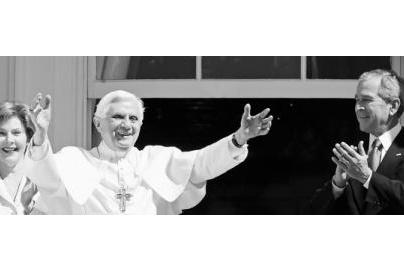U.S. Sexual-Abuse Crisis Addressed
By Father Raymond J. De Souza
National Post (Canada)
April 17, 2008
http://www.nationalpost.com/opinion/columnists/story.html?id=3b38982f-466c-41a9-bd63-85db3b377e72&k=96545
WASHINGTON -Addressing American bishops yesterday, Pope Benedict XVI delivered a frank assessment of the challenges facing the Catholic Church in the United States. After leading the bishops in an evening prayer service marked by the traditional music and use of Latin that Benedict favours, he delivered a lengthy speech that emphasized the need for a strong Catholic witness in public life, the need for healing after the sexual-abuse crisis, and the danger of drifting away from the faith into a "quiet apostasy."
 |
Photo by Paul J. Richards |
"It strikes me that here in America, unlike many places in Europe, the secular mentality has not been intrinsically opposed to religion," he said, praising America's tradition of religious liberty and tolerance. "Within the context of the separation of Church and State, American society has always been marked by a fundamental respect for religion and its public role, and, if polls are to be believed, the American people are deeply religious."
At the same time, such religious tolerance can "subtly reduce religious belief to a lowest common denominator" in which faith is separated from everyday life, and "each person believes he or she has a right to pick and choose, maintaining external social bonds but without an integral, interior conversion to the law of Christ. ... We have seen this emerge in an acute way in the scandal given by Catholics who promote an alleged right to abortion."
Earlier in the day, Nancy Pelosi, Speaker of the House, and one such Catholic, made a very public act of reverence at the White House, kissing the Papal ring -- perhaps anticipating such direct correction.
Francis Cardinal George, president of the American bishops, acknowledged that the sexual abuse crisis had "been very badly handled" by some bishops in his welcome address. Benedict took the invitation to speak directly to the bishops' responsibility.
"As you strive to eliminate this evil wherever it occurs, you may be assured of the prayerful support of God's people throughout the world," Benedict said. "Rightly, you attach priority to showing compassion and care to the victims.
"It is your God-given responsibility as pastors to bind up the wounds caused by every breach of trust, to foster healing, to promote reconciliation and to reach out with loving concern to those so seriously wronged.... It is vitally important that the vulnerable always be shielded from those who would cause harm."
Benedict placed "the sin of abuse within the wider context of sexual mores," identifying in particular the scourge of pornography. "What does it mean to speak of child protection when pornography and violence can be viewed in so many homes through media widely available today?"
Speaking as one bishop to another, the Pope told the bishops that they were to be models of the Christian life they preach to others: "Time spent in prayer is never wasted, however urgent the duties that press upon us from every side."
Such interior life is essential to avoid the separation of everyday life from the life of faith, the Pope argued, noting the "alarming decrease in Catholic marriages," the dramatic decline in priestly vocations and the temptation to drift away from church observance.
Earlier in the day, Benedict was formally welcomed at the White House by U.S. President George W. Bush, who gave him the most prominent welcome of his administration. Mr. Bush told the Pope that America "needs his message" that God is love against the threat of religious violence; that the truth can be known against the emptiness of moral relativism; and that every life is sacred against attempts to debase or degrade human life.
"I come as a friend, a preacher of the gospel, and one with great respect for this vast pluralistic society," Benedict said in response. "From the dawn of the Republic, America's quest for freedom has been guided by the conviction that the principles governing political and social life are intimately linked to a moral order based on the dominion of God the Creator."
Both men noted that the Declaration of Independence rooted its claim to political liberty in an appeal to the "laws of nature and nature's God."
Benedict and Mr. Bush then had a private meeting, in which they discussed religious liberty and human rights, the Mideast with particular reference to Iraq and the Palestinian-Israeli question, sustainable development, AIDS, immigration and terrorism.
Last evening concluded with a White House dinner, even though Benedict did not attend. It included all five Catholic Supreme Court justices, as well as prominent Catholics in Congress and cultural life.
Any original material on these pages is copyright © BishopAccountability.org 2004. Reproduce freely with attribution.